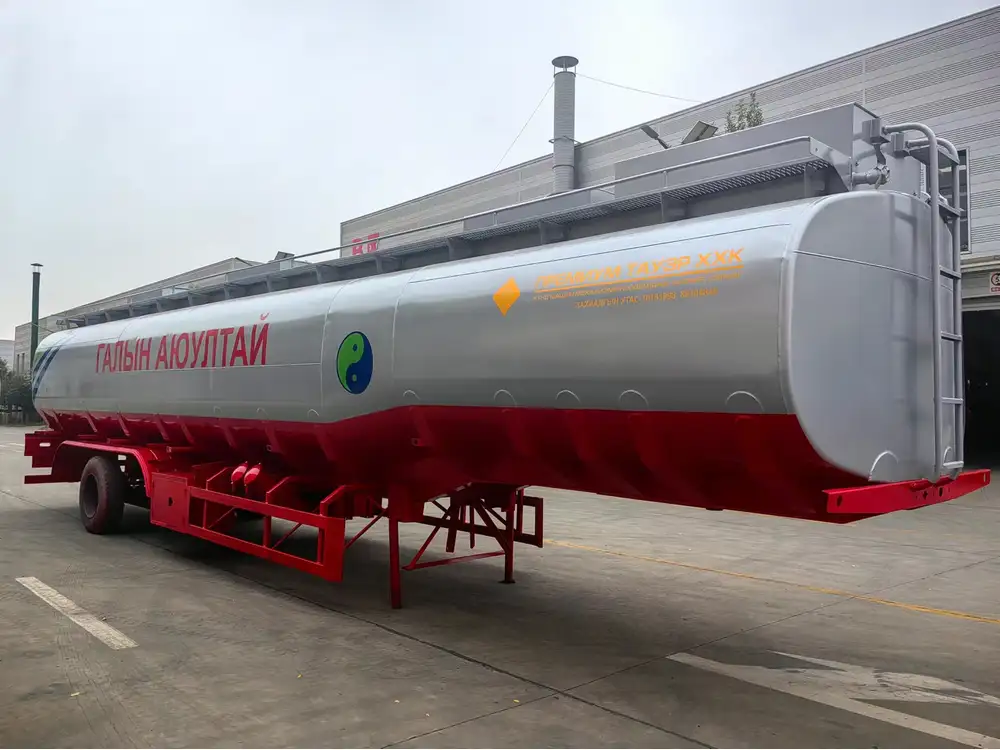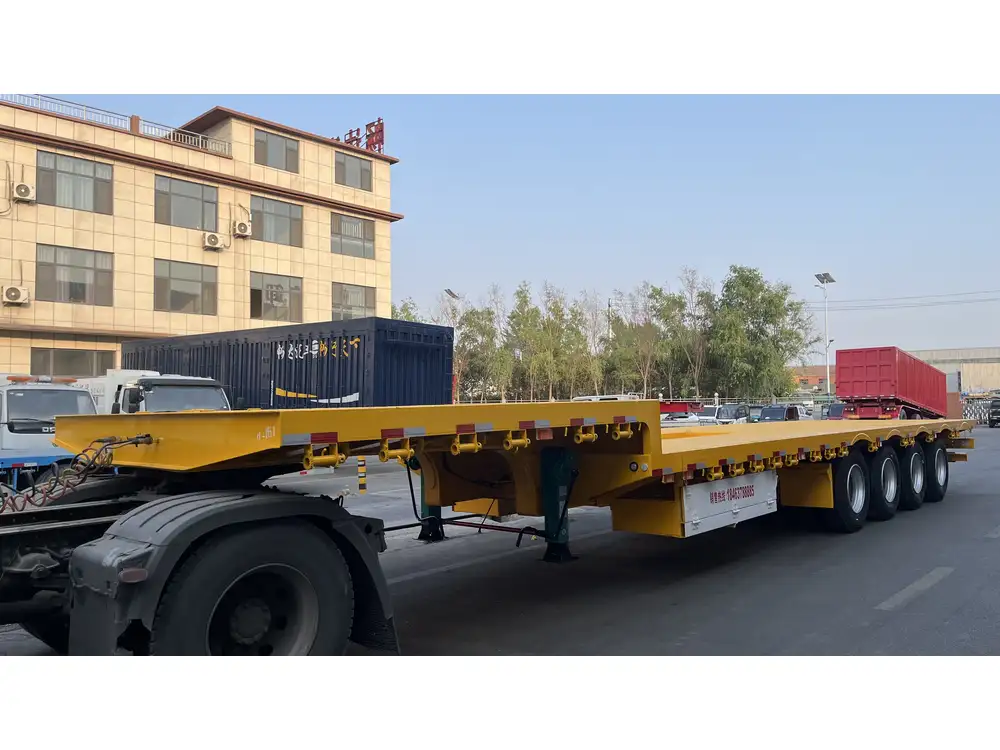Dump trailers have become indispensable tools in the construction, landscaping, and waste management industries. As the demand for efficient waste transport and material hauling grows, so does the need for understanding the costs associated with dump trailer loads. In this article, we address the core questions surrounding the pricing of dump trailer loads, empowering you with the knowledge to make informed decisions.
What Influences Dump Trailer Load Pricing?
When considering the cost of a dump trailer load, several factors come into play. Understanding these variables can help determine the overall price and enable you to budget effectively for your project.
1. Material Type
Different materials have varying densities and disposal requirements, affecting the price. Common materials include:
| Material Type | Density (lbs/yd³) | Average Cost per Load |
|---|---|---|
| Soil | 1,000 lbs | $300 – $500 |
| Gravel | 1,400 lbs | $350 – $550 |
| Concrete | 2,500 lbs | $450 – $700 |
| Asphalt | 1,600 lbs | $400 – $600 |
| Demolition Waste | 1,600 – 2,500 lbs | $500 – $800 |
The heavier the material, the greater the cost, particularly in terms of labor and disposal fees.

2. Volume and Weight
Dump trailers have a specific capacity that can influence pricing. Most trailers have a weight limit of about 10,000 to 14,000 pounds. Here’s how volume plays a role:
| Trailer Size (yd³) | Max Weight (lbs) | Cost Range |
|---|---|---|
| 5 yds | 10,000 | $300 – $500 |
| 10 yds | 14,000 | $400 – $700 |
| 15 yds | 18,000 | $500 – $900 |
Transporting loads that exceed these limits can incur additional fees both for excess weight and for special handling.
3. Distance
The distance to the disposal site significantly affects pricing. Transportation costs, often calculated per mile, can add up quickly. Here’s a quick breakdown:
| Distance (miles) | Average Transportation Cost |
|---|---|
| 0 – 10 | $100 – $150 |
| 10 – 25 | $150 – $300 |
| 25 – 50 | $300 – $500 |
Consider additional factors such as traffic and road conditions, which might further influence these costs.
4. Local Regulations and Fees
Different regions have varying regulations regarding waste dumping, which can include landfill fees, sorting fees, and even hazardous material handling fees. These additional costs can make a significant difference in final load pricing.

5. Rental vs. Service Rate
Choosing between renting a dump trailer or hiring a service will impact the cost:
- Rental Rates: Often range from $150 to $300 per day, plus extra charges for mileage and disposal.
- Service Rates: Typically, a flat rate encompassing unloading, transportation, and tipping fees can be more cost-effective for larger jobs, generally ranging from $300 to $800.
Estimating Your Dump Trailer Load Cost
To provide a clearer idea, here’s a step-by-step method to estimate your dump trailer load cost based on prior variables.
1. Determine Material Type
Identify the type of material you need to transport. Is it gravel, soil, or debris? Understand its density, which is pivotal for calculating the total weight.

2. Calculate Volume and Weight
Use the formula for volume in cubic yards: [ \text{Volume (yd³)} = \frac{\text{Length (ft)} \times \text{Width (ft)} \times \text{Height (ft)}}{27} ]
Multiply this by the density to find the total weight: [ \text{Weight (lbs)} = \text{Volume (yd³)} \times \text{Density (lbs/yd³)} ]
3. Assess Distance
Check how far the trailer will need to travel to deposit the load. This influences the transport cost significantly.
4. Add Local Fees
Research local regulations and add any applicable fees to the estimate, including licensing or environmental fees.

5. Choose Service vs. Rental
Decide based on your project’s scale; for smaller jobs, renting may be cost-effective, while larger projects may benefit from a full-service rate.
Example Calculation
Imagine you have 8 cubic yards of gravel (1,400 lbs/yd³) needing transport 10 miles to a construction site.
- Volume: ( 8 \, \text{yd³} )
- Weight: ( 8 \times 1,400 = 11,200 \, \text{lbs} )
- Transport Cost: Approximately $150 for 0 -10 miles.
- Material Cost: Roughly $400 for the gravel (average $50/yd³).
- Total Estimated Cost: $150 (transport) + $400 (material) = $550.
Choosing the Right Dump Trailer
Understanding the nuances of dump trailers is essential for those needing to haul materials efficiently. Here’s a comparison of the most commonly used types of dump trailers and their applications:

Types of Dump Trailers
| Trailer Type | Description | Best Use Case |
|---|---|---|
| Standard Dump Trailer | Ideal for bulk material transport. | Construction projects; landscaping. |
| Side Dump Trailer | Allows dumping on the side; better for loading and unloading on tight spaces. | Limited access areas; bulk materials. |
| Double Dump Trailer | Carries more weight with two dumping options. | Large construction sites; aggregate. |
| Roll-off Dump Trailer | Ideal for waste management; containers can be swapped out easily. | Demolition; roofing jobs. |
Factors to Consider when Selecting a Dump Trailer
- Capacity Requirements: Analyze the volume and weight of materials you’ll be transporting.
- Terrain Conditions: Assess road conditions; certain trailers perform better on uneven surfaces.
- Loading and Unloading Needs: A consideration for where and how materials will be loaded.
- Budget Constraints: Balancing between upfront costs and potential long-term savings.
Maintenance Tips for Dump Trailers
Proper maintenance can prolong your dump trailer’s lifespan and improve its performance. Here are key points to consider:
- Regular Inspections: Check for any signs of wear and tear, including brakes, tires, and hydraulic systems.
- Lube Moving Parts: Regular lubrication of moving parts ensures smooth operation and prevents rust.
- Tire Pressure Maintenance: Identify and correct any tire pressure issues to facilitate safe and efficient transport.
- Cleaning: Frequent cleaning of any accumulated debris helps maintain structural integrity and appearance.

Conclusion
The cost of a dump trailer load can fluctuate based on numerous variables. By understanding material types, weight considerations, transport distances, local regulations, and the decision between renting or hiring a service, users can develop a more accurate cost estimate. Making informed calculations about your project needs ensures optimal budgeting, allowing for efficient and smooth operations. As demand for semi-trailers continues to rise, it’s crucial to remain aware of the nuances that influence trailer pricing. Proper maintenance and judicious selection of trailers can further optimize costs and performance. By grasping these aspects, you position yourself favorably in the market, ensuring each transportation task is undertaken with confidence and skill.



